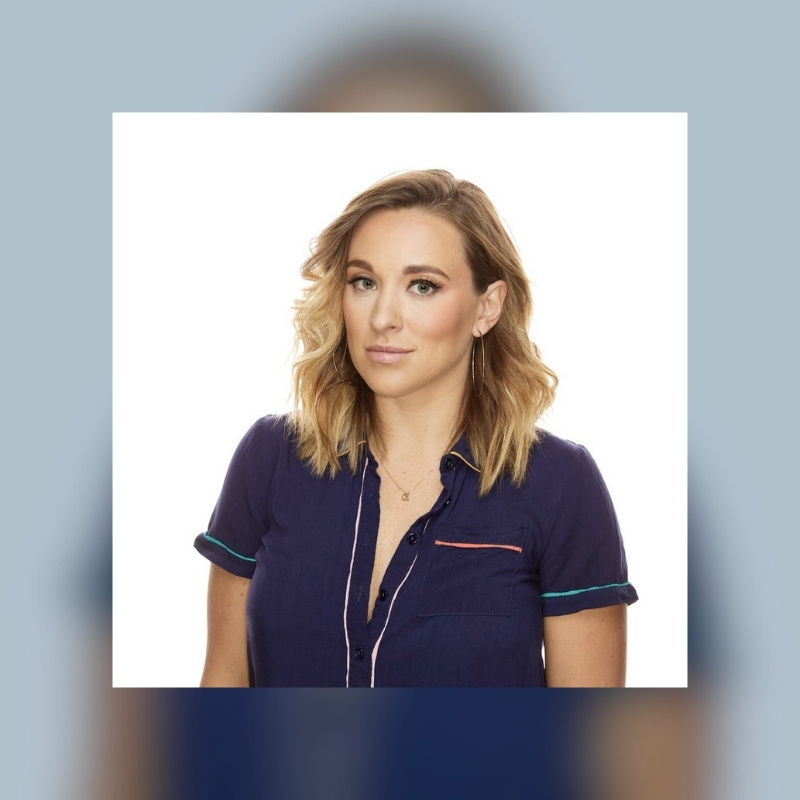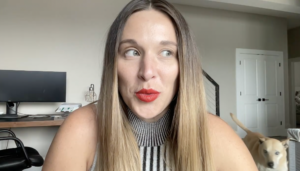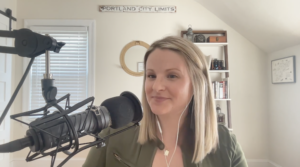Ashley Flowers is the creator and host of the Crime Junkie podcast and founder and CEO of audiochuck, the podcast network behind even more chart-topping shows like The Deck, Counterclock, Strangeland, and more.
In this conversation, Ashley shares the origin story of Crime Junkie and what goes into creating ethical true crime content. She also gets personal about her experiences with pregnancy and motherhood.
As we chat about true crime, podcasting, motherhood and more, Ashley shares some behind the scenes details of her very first novel All Good People Here and how her years of true crime podcasting helped her write a twisty-turny feels-real story that any true crime fan will love.
Read the first two chapters of All Good People Here and order now to dive into the perfect novel for a true crime podcast fan.
A PEEK AT OUR CONVERSATION
The Crime Junkie Origin Story
Kylie: I’ve been a longtime Crime Junkie listener from the early days. I consume everything audiochuck puts out. But I realized in preparing for this, I don’t know a ton about Ashley, the human and where you were before you started Crime Junkie, so what is that origin story of Crime Junkie and audiochuck?
Ashley: I was always consuming these true crime books, true crime documentaries, true crime podcasts, everything. At some point I’m like, okay, I’m taking all of this in, what am I doing? How am I helping? If I’m gonna get my entertainment from this, how am I going to give back? Because it felt too voyeuristic, too icky, just to have it be a one way relationship.
Long before the podcast, it started with my volunteer work. I’ve always been very into volunteering… But when I was in my mid-twenties I decided, you know what, I should be volunteering in this space. Again, I was looking for a way to give back. In a perfect world, I would’ve solved the cold cases, but they weren’t gonna let me do that.
I found my local Crime Stoppers. I was really on a mission to find some kind of organization that was helping with cold cases. I honestly hunted down the executive director and begged him to let me do something.
So, I was their volunteer coordinator. I got more and more involved, and then they eventually put me on their Board of Directors and was their youngest board member. One of the problems that they were having is they said, no one your age knows what the program is. We really think it’s gonna die out. Can you do some local brand awareness?
I connected with a local radio station here in Indianapolis, and we struck up this deal and I said I’ll come on every Monday and I’ll tell a true crime story. In exchange, you need to advertise for Crime Stoppers in your morning spot to a young audience. I didn’t get paid for it. It was like basically another branch of my volunteer work.
The radio station went to number one. It was their most popular segment. This is the first time that I realized maybe I could tell these stories in a different way.
Creating Ethical Content
Kylie: A lot has changed in the true crime landscape and certainly out of necessity. We’re at a shift in the industry…
Ashley: I hope it is an actual shift and not just a trend, because lately there have been a lot of people talking about true crime ethics and how to make responsible content and it’s all I’ve ever wanted. I hope that that’s true.
I think the shift is coming because if you would’ve looked back even before we started Crime Junkie, the true crime genre for a while was like a secret that we all kept. We like true crime, but no one’s talking about it. There aren’t a hundred thousand true crime podcasts.
And so I think as it became more popular and more in everyone’s face, and there’s something about podcasts that feels accessible, too. I think it’s actually given family members a lot of power because where before it was hard to get on TV or radio — there’s a lot of mystery about how those things are made and who’s creating them — with podcasts, you could write into a podcast or it was easier for them to get on podcast or to start their own podcast. And so I think podcasting has given victims families a voice.
The medium of podcasting has a lot to do with this shift in ethical true crime with these families and survivors coming forward and saying that we should be a part of these stories that you’re telling. You can’t exploit us. We need to be working together. We need some ownership over our story.
I’ll never say that I was perfect. The one thing that I’m so grateful for is the very first episode I ever put out was on Niqui McCown. This is a local story of a woman of color who I don’t think enough people know about so this is the first one that I wanna tell. The day after it came out her daughter contacted me because she heard the episode and wanted to get in touch.
It was this instant reminder for me from day one that I’m not talking about characters or a random story. I am talking about people who lived the worst time of their lives and every word I say is probably going to be heard by the person who lived it. And if I were that person, would I be happy with the way that I’m portraying their loved ones case?
About All Good People Here
Kylie: You’ve said before about Crime Junkie that it was the show you couldn’t find that you wanted to listen to. Is All Good People Here the book that you couldn’t find that you wanted to read?
Ashley: It truly is. I have made like a thousand jokes. I literally think on our website I poke fun at Gillian Flynn, ‘cause I’m like, girl, I don’t know where you’ve been. I’m still waiting for another book!
The way I was consuming all these true crime podcasts and there just wasn’t enough for me, that’s how I feel about these books. I will read every mystery thriller. I listen to audio books, I’ll pick them up at the store. I love, love, love them. And there just isn’t enough good ones where I cannot see the ending coming and so I wanted to make the book that is for people just like me.


